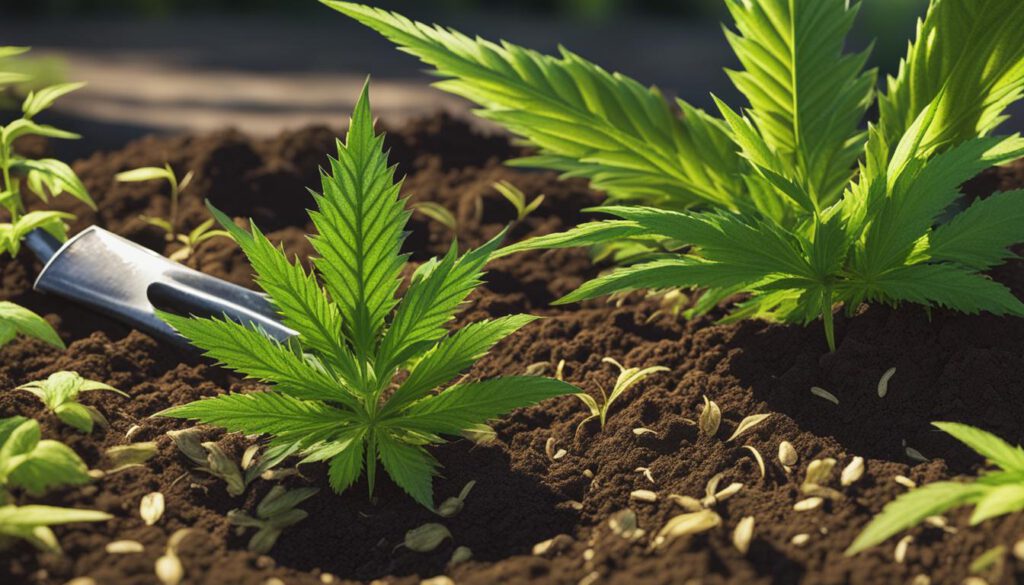In order to cultivate healthy cannabis plants, optimizing soil composition is a crucial first step. Creating nutrient-rich soil that meets the specific needs of your plants can enhance their growth and yield, as well as increase the overall quality of your crop. In this comprehensive guide, we will explore the key factors to consider and the steps to take to achieve the best soil composition for cannabis growth.
Key Takeaways:
- Optimizing soil composition is crucial for healthy cannabis plant cultivation
- Creating nutrient-rich soil helps enhance plant growth and yield
- Understanding the role of soil in cannabis cultivation is essential
- Assessing soil composition is necessary for determining specific plant needs
- Choosing the right soil amendments and nutrients is crucial for success
Understanding the Role of Soil in Cannabis Cultivation
As a cannabis grower, you know that your plants’ health depends on various factors, and soil is one of the most critical ones. Enhancing soil quality for cannabis plants is essential to achieving optimal growth and yield.
Soil is the foundation of your cannabis crop, providing nutrients, water, and support to your plants. Achieving the ideal soil composition for healthy marijuana plants involves several factors, including texture, pH levels, nutrient content, and fertility.
Improving soil fertility for cannabis cultivation requires understanding the soil’s chemical and physical properties. Soil fertility refers to the soil’s capacity to provide nutrients that are essential for plant growth. The ideal soil composition for healthy cannabis growth is one that provides all the necessary nutrients in the correct proportion and maintains good water-holding capacity, aeration, and drainage.
Soil quality is another critical factor in cannabis cultivation. Soil quality refers to the soil’s ability to support plant growth in a way that is sustainable and minimizes negative effects on the environment. Enhancing soil quality for cannabis plants involves building and maintaining a healthy soil ecosystem by increasing beneficial microbial activity, improving soil structure, and promoting organic matter accumulation.
Understanding the Basics of Soil
Soil is a complex ecosystem that is made up of several components, each with a unique role to play in supporting plant growth. The major components of soil include:
- Mineral particles: sand, silt, clay, and rock fragments
- Organic matter: decomposed plant and animal material, and living organisms such as bacteria, fungi, and earthworms
- Water: the medium that transports nutrients to plant roots
- Air: necessary for root respiration and beneficial microbial activity
The ideal soil composition for healthy cannabis plants contains a balance of these components. For example, the ratio of mineral particles to organic matter should be balanced, with a higher proportion of organic matter being better for plant growth.
Assessing Soil Quality and Composition
Improving soil fertility and quality for cannabis cultivation involves assessing your soil’s current state. Several methods can help you determine your soil’s composition and quality, including:
- Soil tests: These tests help you determine the soil’s nutrient content and pH levels. By analyzing your soil samples, you can determine any nutrient deficiencies or imbalances and adjust your soil composition accordingly.
- Visual inspection: This technique involves observing your soil’s color, texture, and structure to determine its characteristics. For example, sandy soil feels gritty and is light-colored, while clay soil is smooth and hard when dry.
By assessing your soil composition and quality, you can determine the ideal soil amendments and nutrients to use for healthy cannabis growth.

Enhancing soil quality for cannabis plants and achieving an ideal soil composition for healthy marijuana plants is key to the success of your cannabis cultivation. Understanding the role of soil and assessing its composition and quality are essential steps towards maximizing your crop’s yield and quality.
Assessing Soil Composition for Cannabis Growth
To achieve healthy cannabis plants, you must first assess the composition of your soil. By maximizing soil health, you’ll create optimal soil conditions for healthy cannabis growth. Here are the key indicators to look for when assessing your soil:
- pH levels: The pH level of your soil affects the availability of nutrients to your cannabis plants. The optimal pH range for cannabis growth is between 6.0 and 7.0.
- Nutrient content: Cannabis plants require certain nutrients to thrive, such as nitrogen, phosphorus, and potassium. Test your soil to determine its nutrient content and address any deficiencies accordingly.
- Texture: Soil texture affects water retention and drainage. Cannabis plants require well-draining soil, so check the texture of your soil to ensure it’s suitable for cannabis cultivation.
By cultivating cannabis with nutrient-rich soil, you’ll promote healthy growth and maximize your yield. Conduct regular soil tests and adjust your soil composition as needed to maintain optimal soil conditions.
If you’re unsure about how to assess your soil composition, there are several soil testing kits available that are easy to use and provide accurate results. You can also seek advice from a professional cannabis grower or a gardening expert.
Choosing the Right Soil Amendments and Nutrients
Now that you have assessed your soil composition, it’s time to address any deficiencies and enhance its nutrient content. This step is crucial for optimizing soil nutrients for marijuana cultivation and maximizing your crop’s yield and quality.
Soil Amendments: There are various soil amendments that you can use to improve soil fertility and nutrient content, such as compost, manure, and worm castings. These organic materials are rich in nutrients and promote healthy soil structure. You can also use mineral-based amendments like perlite, vermiculite, and sand to improve soil drainage and aeration.
Nutrients: Cannabis plants require a range of macronutrients and micronutrients for healthy growth and development. These include nitrogen, phosphorus, potassium, calcium, magnesium, sulfur, iron, zinc, and more. You can supplement your soil with these nutrients using organic or synthetic fertilizers. It’s important to choose the right formulation and application method based on your soil’s needs and the growth stage of your plants.
Organic vs. Synthetic: Organic fertilizers are derived from natural sources like animal waste, bone meal, and seaweed. They release nutrients slowly over time and improve soil health and structure. On the other hand, synthetic fertilizers are made from chemical compounds and provide an immediate burst of nutrients. They are easy to use and control, but can also contribute to soil degradation and environmental pollution. Consider your goals and values when choosing between organic and synthetic fertilizers.
Application: When applying soil amendments and nutrients, it’s important to follow the recommended rates and methods. Overuse of fertilizers can lead to nutrient burn and toxicity, while underuse can result in nutrient deficiencies and stunted growth. You can apply amendments and nutrients directly to the soil or mix them into your growing medium. You can also use foliar sprays to deliver nutrients directly to the leaves.

By choosing the right soil amendments and nutrients and applying them correctly, you can optimize the soil composition for healthy cannabis plants. A balanced and nutrient-rich soil mix is essential for maximizing yields and producing high-quality buds.
Creating a Balanced Soil Mix for Cannabis Plants
Creating a balanced soil mix is crucial for growing healthy cannabis plants. It ensures that your plants receive the right nutrients at the right time, leading to a successful yield. Begin by collecting all the essential components you need for your soil mixture, including organic matter, minerals, and other additives.
The ideal soil composition for cannabis growth is one that is rich in organic matter, well-draining, and slightly acidic. Organic matter can come from compost, peat moss, or other natural sources. Minerals such as perlite, vermiculite, and sand help with drainage and aeration. You can also add other components, such as bone meal or blood meal, to provide additional nutrients that are beneficial for cannabis cultivation.
The ratio of each component in your soil mix will depend on your specific soil needs. A general ratio to start with is one-third organic matter, one-third minerals, and one-third additives. Mix the components thoroughly to ensure even distribution.
The type of soil you use is also essential. Cannabis plants thrive in well-draining soil, so avoid using heavy clay soils that retain water. Loamy soils are the best choice for cannabis cultivation as they combine sand, clay, and silt for a well-balanced mix.
Once you have prepared your soil mix, it is important to test its pH levels. Cannabis plants prefer a slightly acidic soil pH between 6.0 and 7.0, which provides optimal nutrient uptake. Use a pH testing kit to determine the pH of your soil mix and make any necessary adjustments using pH adjustment products.
Healthy soil is vital for cannabis cultivation, and creating a nutrient-rich and balanced soil mix is the first step towards a successful yield. Take the time to assess your soil composition, make any necessary adjustments, and create the perfect soil mix for your cannabis plants.
Implementing Soil Management Practices
To ensure healthy cannabis growth, it is essential to implement proper soil management practices. Soil management includes a variety of techniques aimed at enhancing soil quality and improving soil fertility for cannabis cultivation.
Crop Rotation
Crop rotation is a technique that involves growing different crops in the same soil over a specific period. This technique is useful for preventing the depletion of soil nutrients and reducing the likelihood of soil-borne pests and diseases.
Implementing crop rotation involves growing different kinds of crops in the same soil over several seasons or years. Crop rotation allows your cannabis plants to receive the necessary nutrients while avoiding nutrient buildup and pest build-up.
Cover Cropping
Cover cropping involves growing plants in the soil that is not intended for the primary crop. It is useful for preventing soil erosion, increasing water retention, and preventing soil nutrients depletion.
Cover crops can improve soil health by providing vital nutrients, control soil erosion, and suppress weeds. Some suitable cover crops for cannabis cultivation are alfalfa, clover, and rye.
Mulching
Mulching involves covering the soil with organic or inorganic materials to conserve soil moisture and promote healthy soil.
Organic mulch, such as leaves, straw, and wood chips, can improve soil structure, prevent erosion, and help regulate soil moisture. Inorganic mulches, such as plastic covers, can also reduce water loss and improve soil structure.
Composting
Composting is the process of decomposing organic materials into a nutrient-rich soil amendment.
Composting can help improve soil structure, water retention, and nutrient content. A well-balanced compost pile contains equal amounts of green and brown materials, such as grass clippings and leaves, and should be turned over regularly to allow for proper decomposition.
Conclusion
Optimizing soil composition is a crucial factor in achieving healthy and productive cannabis plants. By understanding the role of soil in cannabis cultivation, assessing and enhancing its composition, and implementing appropriate management techniques, you can create a nutrient-rich and well-draining environment for your plants to thrive.
Remember to regularly test and monitor the pH levels, nutrient content, and texture of your soil to ensure optimal growing conditions. Choose the right soil amendments and nutrients to address any deficiencies and promote healthy plant growth.
Creating a balanced soil mix with the right ratio of organic matter, minerals, and other components can make a significant difference in the yield and quality of your cannabis crop. Implement soil management practices, such as crop rotation, cover cropping, and mulching, to improve soil fertility and control pests and diseases.
By prioritizing soil health and nutrient optimization, you can maximize your cannabis crop’s yield and quality. Remember that healthy soil equals healthy plants, so invest in your soil and watch your cannabis cultivation thrive.
FAQ
What is the importance of optimizing soil composition for healthy cannabis plants?
Optimizing soil composition is crucial for healthy cannabis plant growth as it provides the necessary nutrients, pH levels, and texture for optimal development and yield.
How does soil quality affect cannabis cultivation?
Soil quality plays a vital role in cannabis cultivation as it directly impacts the overall health and productivity of the plants. Good soil quality ensures proper nutrient availability, water drainage, and root development.
What should I assess when evaluating soil composition for cannabis growth?
When assessing soil composition, it is important to consider factors such as pH levels, nutrient content, and soil texture. These indicators help determine the specific needs of your cannabis plants and guide you in optimizing soil composition.
Which soil amendments and nutrients are beneficial for cannabis cultivation?
There are various soil amendments and nutrients that can benefit cannabis cultivation, such as compost, organic fertilizers, and micronutrient supplements. These help address deficiencies and enhance the nutrient content of the soil.
How can I create a balanced soil mix for cannabis plants?
To create a balanced soil mix for cannabis plants, you need to consider the ideal ratio of organic matter, minerals, and other components. This will help create a nutrient-rich soil that also provides proper drainage for healthy root development.
What soil management practices should I implement for cannabis cultivation?
Proper soil management practices include techniques like crop rotation, cover cropping, and mulching. These practices improve soil fertility, prevent nutrient depletion, and help control pests and diseases.











